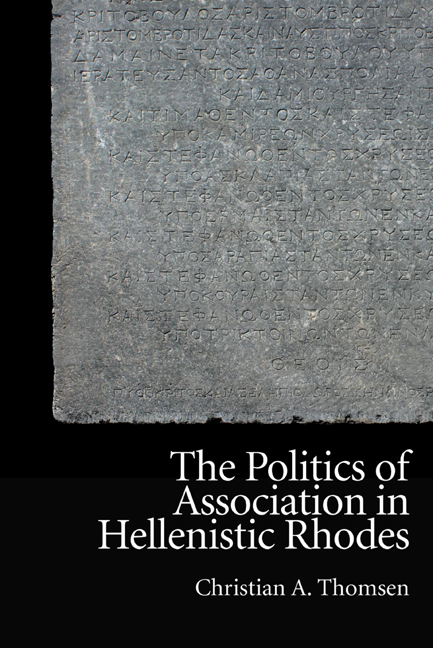Book contents
- Frontmatter
- Contents
- List of Tables and Figures
- Acknowledgements
- Abbreviations of Epigraphic Corpora
- Maps
- 1 Introduction
- 2 Rhodian Democracy
- 3 The Oikos
- 4 Public Associations
- 5 Private Associations
- 6 Private Associations and Human Resources
- 7 The Civic Aspirations of Private Associations
- 8 The Corporate Polis
- Bibliography
- Index Locorum
- General Index
3 - The Oikos
Published online by Cambridge University Press: 08 October 2020
- Frontmatter
- Contents
- List of Tables and Figures
- Acknowledgements
- Abbreviations of Epigraphic Corpora
- Maps
- 1 Introduction
- 2 Rhodian Democracy
- 3 The Oikos
- 4 Public Associations
- 5 Private Associations
- 6 Private Associations and Human Resources
- 7 The Civic Aspirations of Private Associations
- 8 The Corporate Polis
- Bibliography
- Index Locorum
- General Index
Summary
Over the years, the Lindian acropolis came to include a large collection of life-size bronze statues depicting the succession of eponymous priests of Athana Lindia, embodying the passage of time and the continuity of the city's most important cultic institution and by extension the community itself. Many of these statues were set up by proud family members of the priests they portrayed, and over time a good number were incorporated into larger monuments uniting family members, underscoring the presence and importance of another institution: the family.
Among these statues was one set up by Lysistratos son of Pythagoras and adopted son of Euratos, in commemoration of his tenure of the priesthood in Lindos (in 162 BCE), terms as prytanis, agonothetas and grammateus of the boula in the asty, as well as two victories in the choragia. At some later point the statue was detached from its original base and incorporated into a new multiple-statue monument for Lysistratos, his brothers and their father. The epigram carved on the base of the statue and later transferred to the family monument situated Lysistratos’ success squarely within that of his father and brothers (Lindos II 197f.1–4):
Before, our father burned sacrifices on the altar to you, Pallas, as is the custom, within your sacred dwellings, and then we three brothers-in-blood did, to whom alone you granted this, you who inhabit the sacred rock of Lindos.
Lysistratos’ boastful (but also, at the time, truthful) claim concerning the uniqueness of his and his brothers’ achievement, in as much as it belonged to all of them equally, is a clear indication that the honour which election for the priesthood brought with it belonged as much to the family as to the individual priest.
Indeed, at Lindos running for religious office was often a family undertaking. When the Lindians in 99 BCE elected Andron son of Xenomenes and adopted son of Archinos, priest of Athana Lindia for the coming year, they also saw fit to elect his three sons hierothytai for the same year. In fact, several more examples suggest that the Lindians often preferred to stock their college of hierothytai with the sons of the eponymous priest.
- Type
- Chapter
- Information
- The Politics of Association in Hellenistic Rhodes , pp. 49 - 64Publisher: Edinburgh University PressPrint publication year: 2020



